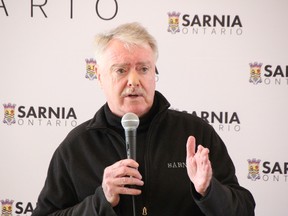Within a week of releasing a new energy policy paper, a national advocacy group that included Sarnia’s mayor was meeting with federal environment ministry staff.

Within a week of releasing a new energy policy paper, a national advocacy group that included Sarnia’s mayor was meeting with federal environment ministry staff.
Advertisement 2
Article content
Normally, arranging such a meeting would take a lot longer, Mike Bradley said.
Article content
“That’s where I’m finding the real value,” he said, about joining Energy for a Secure Future’s advisory council.
Hopes are to continue having similar conversations while touting Sarnia’s strengths in areas such as hydrogen, solar and biochemistry, he said, noting plans are to engage with provincial decision-makers as well.
“To get a non-partisan discussion about energy and where we’re going with it in the next number of years,” Bradley said.
The one-year-old, gas-energy-sector backed civil society initiative’s latest paper, Getting Canada’s Energy Future Right: A Consumer Lens on Energy in Canadatalks about the potential infrastructure-cost, competitiveness-loss and social-license challenges of moving too fast in adapting to greener energy.
Advertisement 3
Article content
Among the arguments made by author Michael Cleland, an energy and environmental policy consultant, is that Canada should make use of existing infrastructure, like the natural gas distribution network, as Canada shifts the way it produces and consumes energy.
“Infrastructure you don’t have to build is the most affordable kind, and in the case of the natural gas system, it can be leveraged for both renewable natural gas blending and hydrogen bending,” it says.
Goals are to make a socially-accepted transition, achieving net-zero emissions by 2050, while maintaining energy fundamentals like reliability, security and affordability, it says.
“We are looking toward a process that is truly sustainable: environmentally, economically, socially and politically,” it says.
Advertisement 4
Article content
Bradley said he found the paper detailed and moderate.
“I think that’s the important part,” he said. “There’s just too much shouting going on on this issue and bumper sticker slogans.”
Carbon capture, hydrogen and various other issues need to be considered more, he said.
“This transition — that’s the word that comes up all the time — you need to do it in a manner that doesn’t cost a significant amount of jobs,” Bradley said.
“In fact, hopefully creates jobs.”
The paper gives government an opportunity to look at different ways of doing things, he said, noting a March 28 webinar the group held received “a good response from some really key people as it relates to energy policy.”
Article content